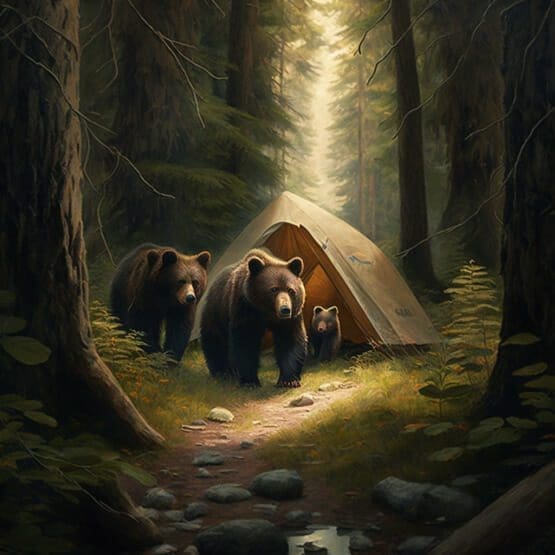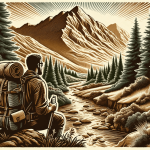How to Store Food When Camping in Bear Country
Camping in bear country comes with its unique set of challenges, and one of the most crucial aspects is ensuring that your food is stored safely and securely. Proper food storage such as in bear-proof containers not only keeps your campsite clean and organized, but it also plays a vital role in reducing the risk of attracting bears and other wildlife to your area. This article will discuss various methods and tips for effectively storing food while camping in bear country. Bears are known to have an incredible sense of smell, which can lead them to your campsite if food odors from food waste such as food scraps, pet food and other smelly items from food wrappers are not adequately contained.
In order to prevent unwelcome encounters, it is essential to learn about bear-resistant storage options, such as bear bags, bear-resistant canisters, and bear boxes, as well as proper food-hanging techniques. By following these guidelines, you contribute to the safety of both humans and bears, while also enjoying your camping experience in the great outdoors.
Understanding Bear Behavior
Bears are opportunistic feeders and have an incredible sense of smell, which leads them to locate food even from miles away. It is essential to understand their behavior when camping in bear country to minimize risks and avoid any potential conflicts. In this section, we will discuss why bears are attracted to food and the dangers of improper food storage when camping.
Why Bears Are Attracted to Food
Bears possess a keen sense of smell, which is far superior to that of humans. This remarkable sense allows them to detect food sources from miles away. Additionally, bears have an omnivorous diet, consuming a variety of plants, insects, and animals. When camping, the smells of human food and other scented items can travel long distances, potentially attracting bears. The odor of cooking, dirty dishes, and garbage may be particularly enticing to them. As bears learn to associate these smells with a food source, they are more likely to venture into campsites in search of an easy meal.
Dangers of Improper Food Storage
Improper food storage can have severe consequences when camping in bear country. If bears obtain human food, they may lose their natural fear of humans and become more aggressive. This behavior puts both the bears and campers at risk. Bears that become accustomed to human food sources can cause damage to property, create safety risks to campers, and may ultimately have to be euthanized if they become a persistent threat.
To ensure the safety of yourself, others, and the bears, it is crucial to store food and other scented items properly when camping. By being aware of the reasons for bear attraction to food and the consequences of improper food storage, campers can take the necessary precautions to minimize encounters while enjoying the outdoors in bear country.
Choosing a Suitable Campsite
When camping in bear country, choosing the right campsite is crucial for keeping your food safe and minimizing the chance of an encounter with bears. Carefully consider the distance from the food preparation area, as well as the proximity to water sources and trails.
Distance from Food Preparation Area
It is important to maintain a safe distance between your sleeping area and your food preparation area. A general guideline is to keep a minimum distance of 100 yards (91 meters) between these areas, to reduce the likelihood of bears being attracted to your sleeping area due to food smells. This approach will also help keep food odors away from your tent. I personally use airtight bags inside of a bear canister for good measure.
Nearby Water and Trails
When selecting a campsite, keep in mind that bears are often attracted to water sources and trails. Avoid setting up camp close to streams or rivers, as bears frequently use them as travel corridors. Similarly, try to find a campsite that is not directly on a hiking trail, since bears may use these paths as well. By considering these factors while choosing your campsite, you can minimize the risk of encountering bears and ensure that your food is stored safely in a secure place. Keeping a safe distance from your food preparation area, water sources, and trails can make a significant difference when camping in bear country.
Proper Food Storage Techniques
When camping in bear country, it’s essential to store your food properly to protect both yourself and the bears. Below are some recommended techniques:
Bear-Resistant Containers
One effective method of storing food in bear country is to use bear-resistant containers which is a good practice when backcountry camping in wilderness areas such as Rocky Mountain National Park for instance. These containers are designed to keep your food secure and away from curious bears looking for an easy meal. The hard-sided containers feature bear-proof fasteners like screw lids or other locking mechanisms, making them an excellent option for storing food in the wilderness (Backpacker). When camping in a national park be sure to follow the food storage rules as the rules could change depending on your local regulations.
Hanging Food Method
Another popular method for storing food while camping in bear country is to utilize the hanging food storage method. This technique involves placing your food and other scented items (such as trash) into a bear bag and hanging it from a pole or sturdy branch. Some designated backcountry campsites even have bear poles or bear cables to help you hang your food more efficiently (Beyond The Tent). When hanging your food, make sure to cinch the drawstring tight and tie the knot as instructed by the manufacturer. Additionally, it’s important to note that some national parks don’t accept bear bags as a bear-proof food-storage method which is why I always bring a bear-proof canister with me, so always check the specific regulations of the area you’ll be camping in before heading out (REI Co-op).
Section 5: Odor-Proofing and Reducing Food Smells
Using Odor-Proof Bags
Proper food storage is essential when camping in bear country. One effective method is using odor-proof bags to reduce food smells that attract bears to your food supply. These food bags are designed to lock in odors, preventing bears and other wild animals from detecting the scent of your food. Keep in mind that the outside of the bag should not touch any food or scented items, as this will negate the odor-proof benefits. Pack your food carefully, and store these bags in a secure and elevated location, such as a bear-proof container or bear hangs. Bears and small animals in search of food could cause them to commit an aggressive act, especially among the bear population.This is why proper food handling is your best bet to staying safe from American black bears, brown bear and grizzly bears.
Cleaning Cooking and Eating Tools
Keeping your campsite clean is just as important as proper food storage. This includes cleaning cooking and eating tools. Scrub all dishes and utensils thoroughly with biodegradable soap after meals, and rinse them with water. Dispose of the greywater away from your sleeping area, ideally at least 100 meters, to deter bears from getting near your tent. Additionally, store your cooking equipment and other scented items, like toiletries, in airtight containers, or at the National Park Service recommended distance away from where you sleep.
By following proper food storage guidelines and maintaining cleanliness at your campsite, you can reduce the risk of attracting bears especially aggressive bears such as grizzly bears, and ensure a safe and enjoyable camping experience in bear country on your next camping trip.
Section 6: Bear-Proofing Your Campsite
Storing Toiletries and Scented Items
Bears are attracted not only to food but also to other scented items, such as toiletries, in your camp. This includes items such as lip balm and toothpaste which can be a strong smell that could provoke bear activity. The National Park Service recommends treating toiletries similarly to food, which means storing them away from your sleeping area and not keeping them in your tent at night. You can use a bear-resistant container for these items or hang them with your food in bear-safe containers at least 100 feet away from your campsite. Make sure to follow the local rules when camping at a national park such as Yosemite national Park, Grand Teton, Rocky Mountain National park or even hiking the Pacific Crest Trail.
Keeping a Clean Camp
A tidy campsite is key to reducing the likelihood of attracting bears. Clean up all food debris and cooking equipment promptly after use in your camping area to minimize scents that may attract bears. Always cook and wash dishes at least 100 feet away from your sleeping area, following Princeton University’s Outdoor Action Guide. Dispose of trash and leftover food in a bear-resistant trash container or pack it out with you when you leave the campsite.
Section 7: What to Do in Case of a Bear Encounter
Reacting to a Bear in Your Campsite
If you encounter a bear at your campsite, it is crucial to stay calm and avoid making sudden movements or loud noises. During bear encounters Speak in a calm, assertive voice while slowly waving your arms above your head. This will help you appear larger and more intimidating to the bear. Do not approach the bear or attempt to feed it. If the bear tries to approach you, stand your ground and continue to appear larger by waving your arms.
If necessary, use bear spray to deter the bear if it gets too close. Remember to aim for the bear’s face. If a bear attacks you, fight back with any available objects such as sticks, rocks, or even your bare hands. Aim for the bear’s face, particularly its eyes and nose. This can increase your chances of escaping the attack.
Preventive Measures for Future Campouts
To avoid future encounters with bears while camping, it is essential to follow several preventive measures:
- Store food and garbage in bear-resistant containers and at least 100 feet away from your campsite.
- Clean utensils and food preparation areas thoroughly after cooking and remember food safety is bear safety.
- Dispose of garbage in designated bear-resistant dumpsters or store it securely in your vehicle.
- Use bear-resistant methods to hang your food if containers are not available, such as the counterbalance method, which involves suspending food from a tree or pole at least 10 to 15 feet high and 4 feet away from the trunk or pole. Also, make sure to keep food items out of your vehicle since there is a good chance a bear can break into your car through the door or car window, even if you are car camping.
- Keep pets leashed and do not leave them unattended which goes for small children as well.
Following these guidelines can significantly reduce the risk of a bear encounter, allowing you to enjoy a safe and relaxing camping experience.








